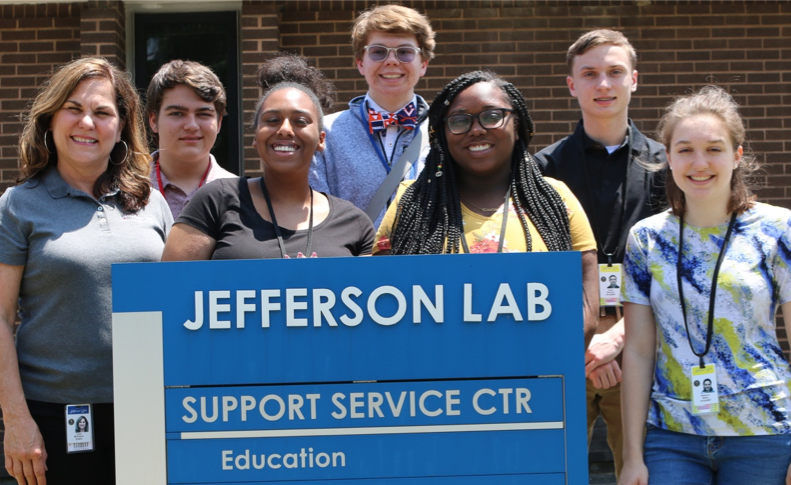After a three-year hiatus, the STEM-focused high school internship program has returned to lab campus
Darren Upton straightened his bowtie and entered the Continuous Electron Beam Facility Center atrium to meet his mentor. It was a moment he had waited three years for. In 2016, Upton learned about the Jefferson Lab High School Summer Honors program and was eager to apply. Unfortunately, this was the same year the program was put on temporary hold awaiting further resources.
“I waited for the program to come back,” said Upton, a recent high school graduate. “I emailed Steve [Gagnon, Science Education administrator] often to see if it had returned.”
When Gagnon alerted Upton the program was back, Upton applied and was accepted as an intern in the Experimental Nuclear Physics division.
On June 10, 2019, Upton and five other carefully selected Hampton Roads high school students began a six-week immersion program at the Department of Energy’s Thomas Jefferson National Accelerator Facility.
After first-day orientation, each student was assigned a dedicated mentor to ensure they had a customized experience at the lab. The students were given real-world projects that supported the mentor’s department initiatives for an authentic experience. These assignments spanned a wide range of activities, including programming, taking measurements, testing hardware, data collection and result analysis.
“I have been mentoring students since 2010. Seeing them learn and watching them be in awe of the amazing science that happens here is so rewarding. I am still in contact with many of my students; they say their Jefferson Lab experience is one of the best they have ever had. As a mentor, I’m grateful to be a small part of that,” Environment, Safety, Health & Quality mentor, Mary Boggs said.
In the early 90s, the Science Education team at the lab saw a need to bridge the pipeline from middle school to college with learning geared toward high school students during the summer.
“We were supporting younger students with programs in science, but it seemed like there was nothing substantial for high school learners,” said Gagnon. After a little teamwork and brainstorming, the High School Summer Honors Program was born.”
“We saw a growing need for what we now know as STEM [Science, Technology, Engineering and Mathematics]. We created STEM initiatives and goals before there was a nationwide push for STEM programs. We were STEM before there was STEM,” Science Education team lead Lisa Surles-Law added.
As Surles-Law and Gagnon shaped the program, they ensured each internship had a high concentration in STEM, with the goal of fostering a life-long interest in those fields. They coupled the STEM-focus with providing high school students tangible experience at the lab.
“I really like the fact that I can work with national and international experts in their fields. That, and have experimental access to big, fun, expensive toys,” Upton laughed.
The High School Summer Honors Program application is now open for the summer of 2020. Interested applicants must attend a local Hampton Roads high school, be at least 16 years old, have a minimum grade-point average of 3.5 and be in good academic standing. The deadline to apply is Feb. 24, 2020.
More information, including the application, can found at education.jlab.org/hsapplication. For questions about the program, contact Carol McKisson at carolm@jlab.org or x7560.
Media Contact: Rebecca Duckett, Communications, duckett@jlab.org x6809


